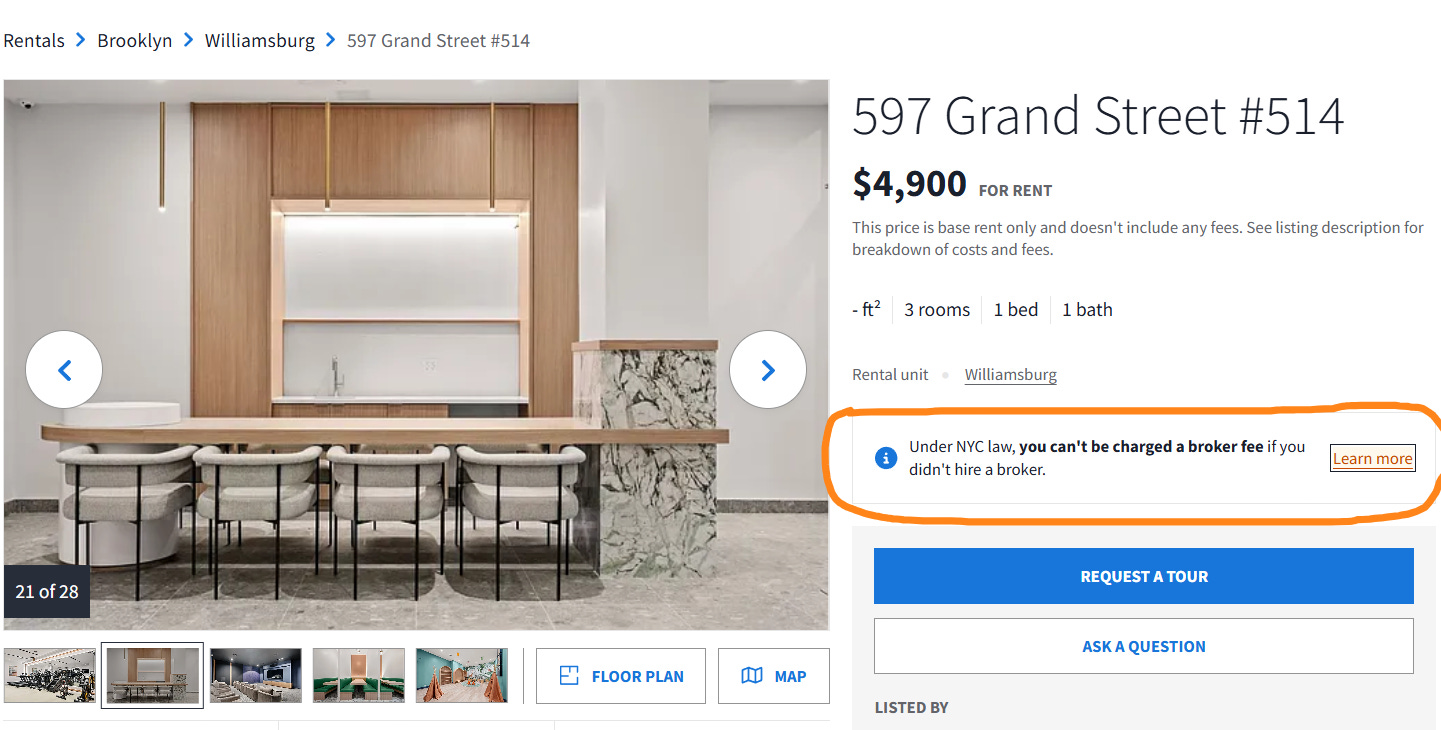The FARE Act: Broker Fees Shift to Landlords
The Fairness in Apartment Rental Expenses (FARE) Act went into effect on Wednesday. To reflect this change, StreetEasy, the go-to portal for finding apartments in NYC, has updated its listing pages to include language regarding broker fees. StreetEasy has also removed the option for rental agents to list apartments as no fee.

According to The Real Deal, the number of apartment-for-rent listings shrank from around 13,515 on the morning of Tuesday, June 10th, down to 12,160 Wednesday afternoon. That works out to 1,355 apartments removed from the site in a 24-hour period. While it’s hard to say how much of that should be attributed to the law or towards natural attrition during a busy rental season, the change in apartment availability represents a 10% decline in a 24-hour period. When I checked yesterday, there were 12,555 apartments for rent in the five boroughs of NYC. Could that much rental inventory really be relegated to the black market thanks to the FARE act?
Under the Fairness in Apartment Rental Expenses (FARE) Act, which I have written about here and StreetEasy covers here, tenants are no longer automatically responsible for broker fees unless they specifically retain a broker themselves. In most cases where landlords or their agents list units and work with brokers, it will now be the landlord’s obligation to pay. This law attempts to resolve the common frustration of renters being asked to pay thousands of dollars to agents they never hired. On its face, it’s a renter-friendly policy. But from the landlord’s perspective, the law creates a new recurring expense line item in a high-expense, margin-sensitive market. When this happens, the market adapts.
Investor Consequences:
Squeezed Cash Flow & Higher Rents: On first lease-up, landlords are now fronting $4,000–$6,000 in cost, equivalent to ~8–15% of annual rent in many cases. Unless rents are increased accordingly, this reduces first-year yield on the unit. This turns a one-time tenant fee into a permanent rent hike.
Example: $5,000 fee on a $3,500/month apartment may lead to a $300/month (capped at 8.8% increase due to Good Cause) rent bump to offset both the fee and lost lease-up time. Over two years, that’s $7,200, or close to 50% higher than the one-time broker fee.
Longer Lease Terms: To absorb these new fees, property owners will likely increase rents. However, increasing the rent to recoup broker fees paid in year one might not be feasible, so this could mean introducing longer lease terms (e.g., 2-year deals) to ensure there is enough time in the lease to spread out the upfront fees. Over the course of a four-year period, slightly higher rents paired with fewer apartment turnover costs, like repainting and cleaning, could balance out to higher margins than units with no landlords fees but high churn.
Self-Leasing Increase: Smaller landlords will avoid the fees altogether by self-managing leasing, while large landlords may insource leasing teams. But medium-sized owners, who often rely on brokers but can’t yet justify a leasing department, may get squeezed. Some of these medium-sized owners may prefer not to lease their units directly and instead rely on relationships with brokers. Instead of using public rental platforms like StreetEasy, agents can retain these apartments as pocket listings to show when appropriate and caveat to renters that they must be hired in order to show these now more coveted opportunities. In these cases, rental inventory in NYC would appear to shrink further, which might lend renters to pay more for apartments.
DSCR Assumptions Shift: Lenders underwriting newly impacted buildings may increase reserves or underwrite slightly lower debt service coverage ratios (DSCRs) in response to perceived lower net operating income, especially if they are less familiar with NYC policy dynamics. Depending on how lenders underwrite this change, lower DSCRs could be the worst consequences of the act and Loan To Value (LTV) metrics could get lightly impacted.
How are you navigating the implementation of the FARE Act?
Take the 100% anonymous survey below.
Curious how this law might impact the value of your building’s cashflows? Reach out to me at rs@sinclairrealtyco.com for an initial review. We will help you evaluate expected broker fees and apartment turnover and model how this might impact sale proceeds or refinancings.
I am bullish on NYC multifamily
Best Regards,
Romain Sinclair
646 326 2220


